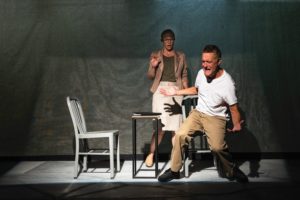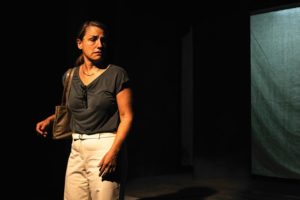Are there crimes so heinous that their perpetrators are beyond redemption? Fritz Lang’s 1930 movie M, starring Peter Lorre as a kindermörder — “child murderer” — ends with doubts about self-righteous anger over his deeds and the desire for vengeance. The killer is caught, ironically enough, by other criminals, who put him on trial outside the law. Lorre begs for mercy. “Ich muss!” (“I must!”) he cries repeatedly, describing his urge to take a child’s life. That alternates with his ambivalence: “Ich kann nicht” (“I cannot”).

In Bryony Lavery’s play Frozen, now playing in an incisive new production at the Harbor Stage Company in Wellfleet, a child murderer, Ralph, admits no remorse over what he has done. Nancy, the mother of the child he has killed — 10-year-old Rhona, who disappeared on her way to her grandmother’s house in a London suburb — suffers relentless grief. Years after the murder, she still contemplates meeting and killing Ralph.
The catalyst in getting Ralph and Nancy to adjust their moral compasses — to be unfrozen, so to speak — is a researcher of serial killers, Agnetha, a New York psychiatrist who travels to London to examine Ralph and meet with Nancy. She tries to convince the aggrieved mother that the best thing she can do for herself is to forgive Ralph and thus let go of the anger stirred by her powerlessness.
Agnetha has her own dysfunctions, of course, and so does Nancy, even though both women are sane, and Ralph, though he’s not especially freakish, is clearly not. How they change, and the soul-testing tempest that results from this triangle of relationships, are the crux of Frozen. Its conclusion, surprisingly, is quite satisfying.
The play opened in Birmingham, England, in 1998 and was picked up by the National Theatre in 2002. An off-Broadway production opened in 2004, with Swoosie Kurtz as Nancy, Brian F. O’Byrne as Ralph, and Laila Robins as Agnetha. It moved to Broadway that year and was nominated for two Tonys; O’Byrne won as best featured actor.
In 2004, Lavery was accused of plagiarism for passages in the play that she lifted from news stories about an actual murder. The issue never went to court, and the author of one of those stories, Malcolm Gladwell of the New Yorker, later wrote that he felt Lavery had done nothing egregious: she took factual elements and mixed them together to create an entirely new fiction. She naively didn’t mask those elements by tweaking them, but Gladwell felt that was ethically irrelevant. I would agree: the ideas presented in Frozen are not new, but the clash of disparate characters and their points of view is original, and that is the genuine art of the piece.
The Harbor Stage production is breathtaking in its starkness; the choices made by director Jonathan Fielding and the performances of the actors — D’Arcy Dersham as Nancy, Stacy Fischer as Agnetha, and Robert Kropf as Ralph — are almost uncomfortably precise.

Dersham — who did great work earlier this season as Halie in Buried Child at Harbor Stage and last year as Olga in Three Sisters — is revelatory as Nancy. Her character is the one the audience will have the most sympathy for, and her subtle shadings make her transformation from grief to acceptance utterly believable.
Fischer’s portrayal of Agnetha is complex and riveting. She presents the researcher as tormented, repressed, and overwhelmed — not necessarily by the gruesomeness of the crimes she studies but because of unfortunate coincidences in her own life.
Kropf, the company’s artistic director, straddles the world of the sane and the depraved with sensitivity and skill. He keeps the bug-eyed histrionics to a minimum, letting the pressure-cooker violence within Ralph escape only at key moments.
The play, which has two acts and lasts a bit over two hours, starts with the characters mostly speaking in monologues and ends with face-to-face confrontations. Despite the merciless horror of Ralph’s crimes, the audience’s experience is neither brutal nor numbing. That is due to Lavery’s thoughtful text and Fielding’s restrained and insightful direction. The stage is nearly bare, with a sheer screen at the back used in suggestive and eerie ways. The dark gray set by Evan Farley and John R. Malinowski, and the lighting by Malinowski, create an ominous mood and emotional distance. It all works flawlessly.
The irony of Frozen is that it’s only the dead who are fixed — the living are able to reinvent themselves. That mournful difference is the heart of the play. In choosing it as its final summer offering, the Harbor Stage once again proves the power and inspired professionalism of its intimate facility and artist-run company.
Mother Courage
The event: Frozen, a play by Bryony Lavery
The time: Through Sept. 4, Thursday through Saturday at 7:30 p.m.; Sunday at 5 p.m.
The place: Harbor Stage Company, 15 Kendrick Ave., Wellfleet
The cost: $25 at harborstage.org or 508-349-6800



